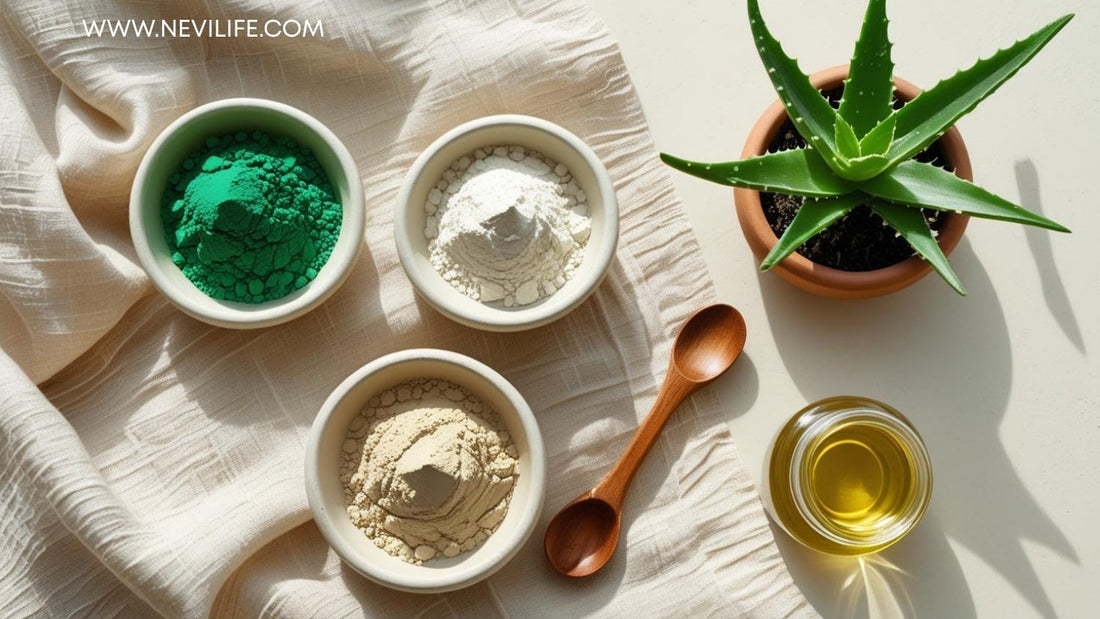
Unclog Your Pores Naturally: The Power of Clay Masks
Share
Clogged pores – they're one of the most common skincare frustrations, leading to blackheads, whiteheads, and a dull complexion. While countless products promise a quick fix, sometimes the simplest and most natural solutions are the most effective. Enter natural clay masks, ancient beauty secrets that are making a powerful comeback for their incredible ability to draw out impurities and leave your skin feeling fresh and clean.

What Causes Clogged Pores?
Before we dive into the solution, it's helpful to understand the culprits. Clogged pores occur when dead skin cells, excess sebum (your skin's natural oil), dirt, and makeup build up inside your hair follicles. This creates a plug, trapping everything beneath the surface and often leading to breakouts and an uneven skin texture. Factors like pollution, humidity, hormonal changes, and improper cleansing can all contribute to this buildup.

Why Natural Clay Masks Are Your Pore-Cleaning Heroes
Clay has been used in skincare for centuries, revered for its absorbent and detoxifying properties. When mixed with water (or other beneficial liquids like apple cider vinegar or floral hydrosols), clay develops a negative electrical charge. This acts like a magnet, drawing positively charged toxins, dirt, and excess oil from deep within your pores to the surface.

Here's why clay masks are so effective for unclogging pores:
-
Powerful Absorption: Clay is incredibly porous, allowing it to soak up excess oil and impurities like a sponge.
-
Detoxification: It binds to toxins and pollutants, pulling them away from your skin.
-
Gentle Exfoliation: As the mask dries, it lightly exfoliates the skin, sweeping away dead skin cells that can clog pores.
-
Tightening Effect: Clay masks can temporarily tighten pores, making them appear smaller and smoother.
-
Mineral Rich: Different clays offer various minerals (like magnesium, calcium, silica) that can nourish the skin.
Choosing Your Clay: The Best Types for Clogged Pores

Not all clays are created equal. While all clays have absorbent properties, some are better suited for specific skin types and concerns. For clogged pores, these are your top contenders:
-
Bentonite Clay: This is a highly absorbent and powerful clay, excellent for very oily or acne-prone skin. It swells significantly when mixed with water, creating a strong drawing action. Use with caution if you have very dry or sensitive skin.
-
French Green Clay: Known for its beautiful green color (from decomposed plant matter and iron oxides), French green clay is highly absorbent and detoxifying. It's a great all-rounder for normal to oily skin types, effectively clearing pores and balancing sebum.
-
Kaolin Clay (White Kaolin): The mildest of the clays, white kaolin is suitable for all skin types, including sensitive and dry skin. While less absorbent than bentonite or green clay, it still effectively draws out impurities without over-drying, leaving skin soft and refreshed.
-
Rhassoul Clay: Hailing from Morocco, Rhassoul clay is rich in minerals like magnesium and potassium. It's known for its excellent absorbing properties while also being very conditioning, making it a good choice for combination skin or those who need deep cleaning without excessive dryness.
How to Use Your Natural Clay Mask for Maximum Results

For the best pore-cleansing power, follow these simple steps:
-
Cleanse First: Always start with a freshly cleansed face to remove surface dirt and makeup.
-
Mix Your Mask: In a non-metal bowl (metal can react with clay and reduce its effectiveness), mix 1-2 tablespoons of clay powder with an equal amount of liquid.
-
For Oily/Acne-Prone Skin: Use apple cider vinegar (diluted with a little water if sensitive) for extra astringent benefits.
-
For Normal/Combination Skin: Water or green tea.
-
For Dry/Sensitive Skin: Floral hydrosols (like rose water or chamomile water) or even plain water. You can also add a drop of a non-comedogenic oil (like jojoba) for extra moisture.
-

-
Apply Evenly: Using clean fingers or a soft brush, apply a thin, even layer of the mask to your face, avoiding the delicate eye and lip areas.
-
Let It Work (Don't Over-Dry!): Leave the mask on for 10-15 minutes, or until it's almost dry but not completely taut and cracking. Over-drying can strip your skin and cause irritation. For very sensitive skin, aim for 5-7 minutes.
-
Rinse Thoroughly: Gently rinse off the mask with lukewarm water, using circular motions to provide a light exfoliation. A soft, damp washcloth can also help.
-
Follow Up: Immediately apply a hydrating toner, serum, and moisturizer. Clay masks are powerful, so replenishing moisture is key to maintaining skin balance.
-
Frequency: For clogged pores, use a clay mask 1-2 times a week. Adjust based on your skin's needs and how it responds.
Beyond the Mask: Maintaining Clear Pores

While clay masks are fantastic, they're part of a larger picture for clear skin:
-
Consistent Cleansing: Wash your face twice daily with a gentle cleanser.
-
Exfoliate Regularly: Incorporate gentle chemical exfoliants (like salicylic acid) or mild physical exfoliants a few times a week to keep dead skin cells at bay.
-
Hydrate Adequately: Even oily skin needs moisture. Well-hydrated skin functions better and can regulate oil production more effectively.
-
Non-Comedogenic Products: Choose makeup and skincare products labeled "non-comedogenic" (won't clog pores).

Embrace the ancient wisdom of natural clay masks and give your skin the deep clean it deserves. With consistent use and the right supporting routine, you'll be well on your way to a clearer, smoother, and truly radiant complexion!